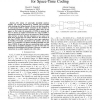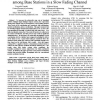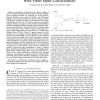15 search results - page 2 / 3 » New Space-Time Trellis Codes for Slow Fading Channels |
GLOBECOM
2007
IEEE
13 years 11 months ago
2007
IEEE
—In this paper, a novel error probability analysis of orthogonal space-time block coding (OSTBC) over independent but not necessarily identical Hoyt (Nakagami-q) fading channels ...
CORR
2006
Springer
13 years 5 months ago
2006
Springer
The notion of universally decodable matrices (UDMs) was recently introduced by Tavildar and Viswanath while studying slow fading channels. It turns out that the problem of construc...
ICC
2007
IEEE
13 years 9 months ago
2007
IEEE
To increase the achievable sum rate of downlink MIMO (Multiple Input Multiple Output) systems, the cooperation among Base Stations (BS) is investigated in a slow fading channel. Th...
CORR
2008
Springer
13 years 5 months ago
2008
Springer
Distributed space-time block coding is a diversity technique to mitigate the effects of fading in multi-hop wireless networks, where multiple relay stages are used by a source to ...
TIT
2011
13 years 12 days ago
2011
—Constellation Constrained (CC) capacity regions of two-user Single-Input Single-Output (SISO) Gaussian Multiple Access Channels (GMAC) are computed for several Non-Orthogonal Mu...



